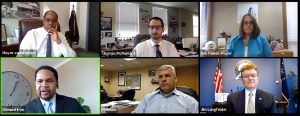Mayors from around Illinois discuss fiscal hits, restarting business
By Jack McCarthy Chronicle Media — April 24, 2020
Mayors from six of Illinois’ largest cities outside Chicago participated in a video conference discussing COVID-19 and their communities’ responses. Clockwise from upper left are: Waukegan Mayor Sam Cunningham, Rockford Mayor Tom McNamara, Champaign Mayor Deb Feinen, Springfield Mayor Jim Langfelder, Joliet Mayor Bob O’Dekirk and Aurora Mayor Richard C. Irvin. (Screen grab of Zoom meeting)
Illinois’ ultimate first responders — mayors of six of the state’s largest cities — don’t see any quick economic recovery when shutdowns forced by the COVID-19 virus come to an end.
Any reopening of the state’s economy — mostly dormant for more than five weeks — will be a slow process, coming in phases.
“People aren’t going to be rushing back to casinos, restaurants (and) malls,” said Aurora Mayor Richard Irvin, who organized an April 22 video conference with five other Illinois mayors.
When the economy restarts, “it’s going to look different,” said Rockford Mayor Tom McNamara. “We, as mayors, have to do the best we can to make sure that, although this is the new normal, that it still functions and works and makes our cities move forward.”
Irvin and McNamara were joined by municipal executives from Champaign, Joliet, Springfield and Waukegan — representing 800,000 residents — as they discussed how their cities have responded to the COVID-19 crisis and prospects for recovery.
Since a March 21 stay-at-home order from Gov. J.B. Pritzker, the six mayors have presided over shuttered cities with closed schools and shopping malls, severely scaled back businesses and restaurants limited to take-out orders.
Most importantly, they’ve had to oversee municipal responses and marshal resources to assist scores of people infected with COVID-19.
“I can say — from Aurora’s perspective — this has affected us greatly,” said Irvin, recently sidelined with the coronavirus infection and has since recovered. “For the most part our citizens of Aurora have stepped up strong. (But) there are those out there that don’t recognize the seriousness of COVID-19 and what it can do to you.”
As of April 22, Illinois had nearly 37,000 COVID-19 cases and 1,688 deaths, including 428 cases and seven deaths in Aurora, the state’s second-largest city.
The numbers may be low since COVID-19 testing has been limited and recent reports suggest that the virus could have been present in the United States in late 2019 and in January, well before the current outbreak.
Limited testing has made it hard to get an exact number of affected people and also trace infections. New drive-up testing sites which opened on Thursday in Rockford and Aurora could help.
“Right now we have just have about 1 percent of the entire county (Winnebago) that’s been tested,” McNamara said.
“The frustration for all that we are having is that the test kits, there’s not enough,” Waukegan Mayor Sam Cunningham said. “They haven’t been (distributed) to us locally and (it’s hard) getting the test results back in a timely fashion. These are frustrating things for us.”
Still, there’s been some clamor to reopen the state’s economy, as has occurred in a handful of states. Georgia, for example, permitted many nonessential businesses to restart on Friday, going against health experts’ warnings that another spike in cases could result.
Five Winnebago County mayors also pushed an economic restart in an April 18 letter to Pritzker.
“We feel that a one-size-fits-all set of restrictions isn’t feasible for the entire state of Illinois. Winnebago County is not Cook County, and quite frankly, counties like ours have a different culture that, by nature, normally utilizes social distancing,” the letter stated. “Countless business owners and employees have been asking ‘If social distancing is working at big box stores, then why can’t the same social distancing measures be safely applied to small businesses?’”
McNamara, mayor of Winnebago County’s largest community, declined to sign it.
“Now is the time to follow science and medicine, what we have been doing is working,” McNamara said in a statement. “Now is not the time to reverse course. A plan to open all businesses on a single day — or to allow a hodgepodge system where each city makes its own rules — is not responsible.”
The letter from Winnebago mayors didn’t do much to sway Pritzker, who announced Thursday that his stay-at-home order would be extended through May 30 with some modifications.
Along with the human toll, cities have also taken serious financial hits. Money from tax receipts and other fees used to provide city services have dwindled. Two shuttered malls and a casino are a particularly hard hit for Aurora while Joliet has two casinos and a major mall closed.
A number of Illinois mayors recently wrote to congressional representatives seeking help.
“It’s nobody’s fault, but the reality is we still have to address the issue of the holes that are going to be put in our budgets,” said Irvin. “Where do we get money to fill that big hole? This is where we’re asking the federal government … to get some assistance.”
Irvin said Aurora faces a $30 million budget hole if it doesn’t reopen by June while Rockford is currently at a $14 million shortfall. Springfield is short as much as $15 million while Joliet ($12 million) and Champaign ($11 million) are also suffering.
Financial matters sometimes dominate discussions, so it’s easy to lose sight of the small stories and local heroes.
Not for McNamara.
“What’s illuminated during a crisis like this is those quiet heroes who every single day are doing amazing work,” he said. “During this crisis they’re helping seniors pick up groceries, creating and delivering free masks and face coverings … seeing that every single day it’s hard not to be inspired.”
Cunningham, meanwhile, shared a consensus that better days are ahead.
“There is a silver light at the end of this tunnel and we’re all going to get there together,” he said.







